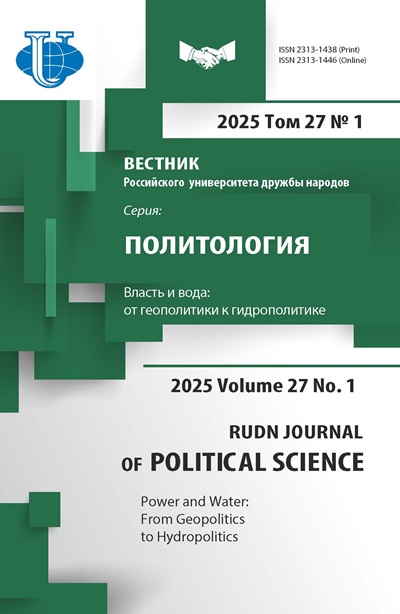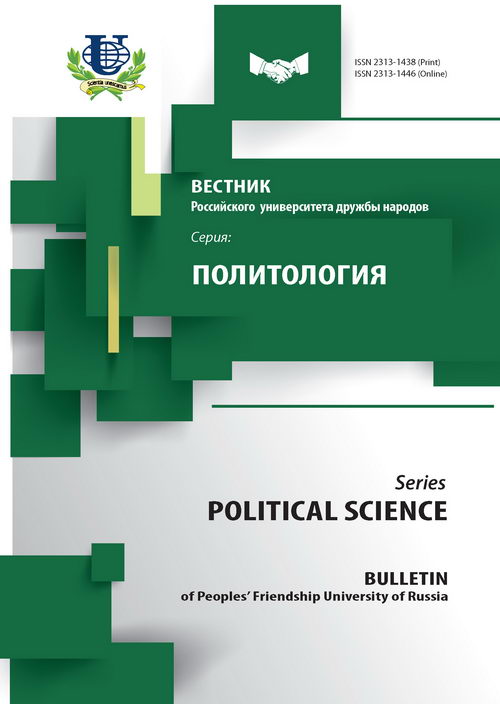No 1 (2012)
- Year: 2012
- Articles: 14
- URL: https://journals.rudn.ru/political-science/issue/view/539
ARTICLES and REVIEWS
 5-15
5-15


Supranational in the European Union and the Sovereignty of Member States
Abstract
The article is devoted to the question of a parity of the supranational in the European Union which as the main principle assumes a principle a priority of the right of the Union over the national right of member states, and also a principle of direct action of the right of the European Union and sovereign statehood of the countries-participants. After all the European Union is an integration community which, certainly, assumes that its participants and founders are the sovereign states. However the presence of two specified principles is not absolutely combined with the developed representations about the international organization.
RUDN Journal of Political Science. 2012;(1):16-21
 16-21
16-21


The Foreign Policy of Modern China: from the Utopia of Nonpolar World to Chinese Reset
Abstract
The author touches the strategic problem of building China's foreign policy, which in a multipolar world will soon make the country do its significative choice and find an opportunity of modernization. Successful exit strategy from the financial crisis has played a low-down trick with Beijing - the «donor of capital» image raised fears among the leading powers. So, the future of China's foreign policy will depend largely on its ability to transition to a more dynamic and flexible response to rapidly changing trends - the «reset».
RUDN Journal of Political Science. 2012;(1):22-27
 22-27
22-27


The Challenges of Multicultural Community in the Modern World: the Politological Analysis of Russian and Foreign Sociological Polls
Abstract
The article is devoted to multiculturalism in the modern world. In view of the current political situation prevailing in European countries and in Russia the topic of building a multicultural society is regarded as the source of one of the most troubling social problem along with the processes of migration and integration.
RUDN Journal of Political Science. 2012;(1):28-34
 28-34
28-34


The Natural Rate of Education as the Factor of Stability of Political Regimes. Part II
Abstract
The given article contains hypothesis about the increasing level of influence of the system of tertiary education on stability of political regimes in many modern countries. In order to reveal the mechanism of such influence the author proposes the concept the natural rate of education which reflects optimal balance between labor market and educational system from the perspective of avoidance and tackling of social protests and instability. The author supposes that the stabilizing function of the system of tertiary education is caused by its role of the specific regulator of labor market and its capability to involve millions of young males, providing them long-term occupation. Under the state policy this stabilizing function may be enormously exaggerated and even reach the point of extremum and become counterproductive. The article contains interdisciplinary approach, being on junction of political science and economics. The author uses selected methodological foundations of the theory of human capital and introduces the following notions: educational pyramid, educational bubble, educational scissors and others.
The second part of the article contains a case study. The cases included are the postWW2 United States, Egypt and Tunisia before the Arab spring and modern Russia. The author stresses that Russian tertiary education system plays a unique and significant political role.
RUDN Journal of Political Science. 2012;(1):35-56
 35-56
35-56


The Main Characteristics of Mass Perception of Political Stability in the Modern Russia: Whether Stability Can Become the National Idea?
Abstract
The article is dedicated to analysis of perception of political stability by the population of the modern Russia. The foundations of the research are the results of recent mass public opinion polls. The author tries to find out if perception of political stability by masses is relevant and the concept of stability can become the new national idea in the mass consciousness.
RUDN Journal of Political Science. 2012;(1):57-66
 57-66
57-66


The Actual Problems of Forming of Russia's Potential of Soft Power
Abstract
The article presents author's vision of Russian cultural influence («soft power») regeneration and further development in the post Soviet Union territory and the rest of the world. Particular attention is paid to the necessity of Russian language learning programs in schools and universities of the CIS countries. There's also emphasis on the need to create a federal agency responsible for development and implementation of Russian public diplomacy, cultural diplomacy, foreign cultural policy, informational and propagandistic maintenance of the foreign policy. The survey also contains analysis of the conditions that are necessary to build up a new model of Russian public diplomacy.
RUDN Journal of Political Science. 2012;(1):67-82
 67-82
67-82


The Main Directions of Improvement of the Russian Military Security
Abstract
In the article the strategic directions of improvement of the Russian military security are analyzed as systems of purposefully state used measures to strengthen national security. The process of improvement of the Russian military security should be put into effect on the basis of official state, military and political directives, to be coordinated by the superior authorities.
RUDN Journal of Political Science. 2012;(1):83-91
 83-91
83-91


(Re-) Reading Adam Smith in a Time of Crisis
Abstract
At a time of not only empirical crisis, but also a philosophical crisis of the underpinning ideologies of the liberal capitalist economic system, there is an increasing tendency to dogmatize the work of classical thinkers, using selective readings of their work as the basis for support or critique of the status quo. Few are as subject to selective reading as the so-called father of modern economics, Adam Smith. This paper seeks to reflect on Smith's thought on two central aspects of the modern crisis: the nature of the limited liability corporation (whose profit motive is increasingly being challenged on a number of grounds) and the role of the individual in a market economy (amid accusations from across the political and philosophical spectrum about the increasing isolation, individualization, and neo-liberalization of the self). These subjects are not as different as they might seem as they both relate to Smith's conception of the nature role of the individual actor - homo oeconomicus - not only in a market in and of itself, but in a market that Smith saw as a social creation and a part of a human community.
RUDN Journal of Political Science. 2012;(1):92-97
 92-97
92-97


Representations about the Future of State in Political Thought (Marxism, Anarchism, Liberalism)
Abstract
In the given article the author states that the representatives of various directions of political thought, such as Marxism, anarchism and liberalism are in whole united in perception that the perfect society as the result of historical development will be based on the institutional foundations distinct from the State.
RUDN Journal of Political Science. 2012;(1):98-106
 98-106
98-106


Transnational Dimension in Comparative Public Politics
Abstract
The article questions the comparative methodology in the field of public policy. Integration processes all over the world require that traditional international comparisons take into account a new transnational dimension.
Considering transnational dimension also demands introducing into research the sociological analysis of transnational actors and their interactions in different levels.
Another important instrument to investigate transnationalization of public policy is policy transfer concept developed by D. Marsh and D. Dolovitz. This question is particularly actual for Russian political science considering that current economic and political reforms are accompanied by a transfer of new political practices and institutions.
RUDN Journal of Political Science. 2012;(1):107-116
 107-116
107-116


The Creativity of the Internet Communication as a Citizen Political Participation
Abstract
The observers of the political relationship development agree that the character and variety of political engagement has evolved overtime into a process continuing and escalating into the foreseeable future.
Communicative tools like information technologies and independent mass media produce an increasing effect on the political practices. These devices can have inevitable consequences for shaping not only modifications but even new trends as does the way in which citizens participate in politics. Capacity of creativity and creative tools, in a variety of forms, are acknowledged to be one of the key ways to expand and mark a new level of citizen influence on the authorities and civil society institutions. This perspective stands behind the increased focus on creativity in information crafting, information interpretation and information perception which, being political participation, enables to add value to political transactions and bring new ideas in the social and political discussions held in the community.
RUDN Journal of Political Science. 2012;(1):117-126
 117-126
117-126


The Shanghai Cooperation Organization Member-Countries: in Search of Common Pathway: a Critical Review of the Monographic Research Presented by Serebryakova N.V. in Her Book Shanghai Cooperation Organization: Multiparty Compromise in Central Asia, Moscow: Inforos, 2011. - 206 p.
RUDN Journal of Political Science. 2012;(1):127-130
 127-130
127-130


On Our Authors
RUDN Journal of Political Science. 2012;(1):131-132
 131-132
131-132
















